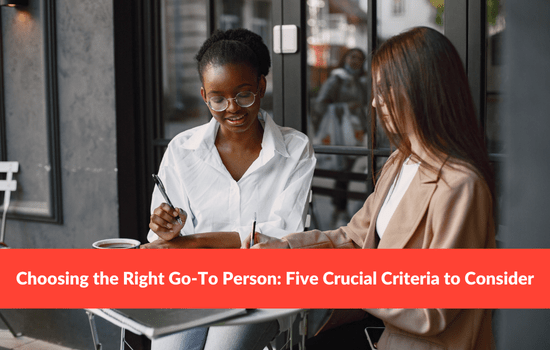Choosing the right go-to person is essential when you need guidance, support, or someone to lean on. By prioritizing trustworthiness, emotional intelligence, objectivity, clear communication, reliability, and compatibility, you can ensure the person you turn to offers the right balance of support and wisdom in your most crucial moments.
Finding Your Support System: Five Must-Have Qualities in a Go-To Person

Life is full of situations requiring us to seek others for help or a fresh perspective. Whether it's navigating a career crossroads, making a challenging personal decision, or seeking emotional encouragement, the right go-to person can make all the difference. However, not everyone in your circle has the reliability or compatibility to provide meaningful support in these pivotal moments.
So, how do you identify the best confidant? In this blog, we’ll explore five crucial criteria to help you find someone who listens and offers guidance and perspective you can count on. The goal is to choose someone who brings clarity to your situation while remaining emotionally neutral—an essential quality when seeking unbiased advice.
Why a Trusted Advisor Matters
We all want support from someone who genuinely cares, but it’s equally important that this person can maintain objectivity. A go-to person overly entangled in your issue may unintentionally let personal emotions or biases cloud their judgment. Striking the right balance is critical to ensuring their advice is constructive and sound.
Five Qualities to Look for in Your Go-To Person
Now, let’s dive into the essential qualities your go-to person should have. While choosing someone who always agrees with you may be tempting, this won’t serve you well in the long run. Instead, focus on these five key traits:
-
Trustworthiness: Trust is the foundation of any strong relationship. Your go-to person should keep your confidence, respect your boundaries, and act with integrity. Without trust, even the most well-intentioned advice can feel hollow or unhelpful. Ask yourself: Do I feel safe sharing my thoughts and feelings with this person?
-
Empathy and Understanding: Emotional intelligence is vital in a go-to person. They should listen without judgment, understand your perspective, and provide support in a compassionate, non-critical manner. This ensures you feel heard and valued, even when discussing sensitive or challenging topics. Someone with empathy can validate your emotions while guiding you toward solutions.
-
Reliability: Consistency is key. A reliable go-to person is someone you can count on when you need advice, support, or action. They show up, listen, and help you navigate challenges without letting you down. Consider whether this person has demonstrated dependability in the past.
-
Problem-Solving Ability: Your go-to person should have strong critical thinking skills and a practical approach to problem-solving. Whether brainstorming solutions or offering a fresh perspective, they should help you address challenges effectively and clearly. Look for someone with a history of providing insightful advice or innovative solutions.
-
Non-Bias and Objectivity: Objectivity is essential, especially when emotions run high. Your go-to person should offer insight and guidance without letting personal opinions or emotions cloud their judgment. Their impartiality ensures that their advice is fair and constructive, helping you make decisions more confidently.
How to Choose Wisely: When choosing your go-to person, keep these criteria in mind. If your current confidant doesn’t embody these qualities, it may be time to reevaluate. Open and honest communication is also critical—share all relevant details as objectively as possible to help them fully understand your situation and provide meaningful advice.
Don’t shy away from seeking the perspective of someone who doesn’t always agree with you. These individuals often provide the most objective and thought-provoking insights, helping you see beyond your blind spots. Remember, having a trusted advisor is a cornerstone of emotional intelligence and personal growth.
Take Your Emotional Intelligence to the Next Level
If you want to develop your emotional intelligence and decision-making skills further, explore these resources: The Power of Emotion: A Practical Guide to Making the Most of Your Emotional Intelligence and The Mindful Journal: Cultivating Emotional Intelligence through Reflective Writing. These books offer actionable strategies to enhance self-awareness and build stronger connections with others.
This article was originally published on September 9, 2017, and has been updated (January 2025).
More Motivational Reads Here »
How Emotionally Intelligent Are You?
Sign up for Linda's monthly tips to build your Emotional Intelligence and reduce Emotional Hijacking!

















